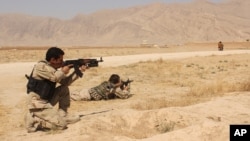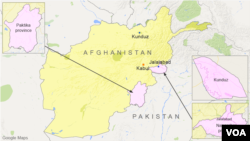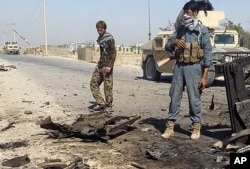Afghan President Ashraf Ghani says Afghan security forces have retaken the northern city of Kunduz from Taliban insurgents after heavy fighting that involved American troops.
"Afghan security forces successfully accomplished their mission and doubts about their abilities and capacity stand removed," the Afghan leader told reporters in the capital, Kabul.
"Fortunately, our forces did not suffer any casualties," Ghani said, adding that they inflicted a heavy toll on Taliban fighters.
Colonel Brian Tribus, a U.S. military spokesman, said U.S. Special Forces advisors accompanied the Afghan fighters in the Kunduz operation and encountered "an insurgent threat." He said the U.S. troops "returned fire in self-defense to eliminate the threat."
Even as the U.S. withdrew its ground forces from Afghanistan at the end of last year, it kept 6,500 troops there to train and advise Kabul's forces. Tribus described the U.S. effort as "a non-combat mission," but said American military personnel had "the right to protect themselves if necessary."
Even as Ghani announced that Afghan troops had retaken Kunduz, he said the success "should not make us complacent."
"The war is ongoing," he said.
Acting Defense Minister Masoom Stanekzai said Taliban guerilla fighters still had a presence in some Kunduz neighborhoods.
"We have to clear all the surrounding areas and open transport links so people can come and go," Stanekzai said.
Interior Ministry spokesman Sediq Sediqqi told VOA Afghan forces launched the offensive overnight and that it was "very successful."
"During the operation, hundreds of Taliban were killed by the Afghan security forces," he said. "Right now we are focusing to help civilians in Kunduz city and at the same time to make sure that the Taliban are not able to again create security troubles there."
Residents in Kunduz told reporters earlier Thursday that Afghan security forces were in control of the city, a claim the Taliban disputed.
Thousands flee fighting
The United Nations said Wednesday the fighting in Kunduz left more than 100 civilians dead or injured and forced 6,000 people to flee the city.
The response by Afghan forces was slowed by the inability of reinforcements to reach Kunduz because of Taliban roadblocks and landmines that led to clashes in neighboring Baghlan province.
But pro-government fighters have been aided by several airstrikes from U.S. warplanes, including one early Wednesday near the Kunduz City Airport that came when coalition special forces encountered a threat from Taliban fighters.
Two other airstrikes were launched Tuesday.
Afghanistan's intelligence agency said one of the coalition airstrikes killed the Taliban's shadow governor for Kunduz province along with 15 other people. But the Taliban on Wednesday reported the governor, Mullah Abdul Salam Akhund, was not killed in the strike. The militant group posted an audio interview, apparently with the governor, in which he dismissed reports about his death, according to the Taliban Voice of Jihad Online.
Ghani under fire
The Taliban capture of Kunduz during a surprise multi-pronged offensive marked the first time the insurgent group captured a major city since being ousted from power in 2001.
Protesters gathered Thursday in Kabul to demonstrate against what they said was the government's failure to provide security to the citizens of Kunduz. They also called for President Ghani to step down.
Ghani, who has been in office for a year, already faced criticism for failing to improve governance and security around the country or to counter widespread corruption in state institutions.
Angry lawmakers in Afghanistan's lower house of parliament called Wednesday for an investigation and accused the government of failing to prevent the attack on Kunduz despite knowing the Taliban was nearby.
Afghan spy agency chief Rahmatullah Nabil apologized to the chamber and the nation for what has taken place in Kunduz. He was summoned to appear along with Interior Minister Noorulhaq Olomi to explain the fall of the city.
Pakistan's response
Pakistani officials rejected the Taliban's takeover of Kunduz this week, calling it an illegal move.
"Afghanistan is run by a democratically elected and legitimate government and occupation of its territory by any group is unacceptable," Foreign Secretary Aizaz Ahmed Chaudhry told reporters Wednesday in New York.
The Afghan government has long accused Pakistan of supporting the Taliban and allowing its fighters and leaders to use Pakistani soil for planning attacks in Afghanistan, which Pakistan denies. Afghan chief executive Abdullah Abdullah said during an address at the United Nations on Monday that some of the Kunduz attackers had come from abroad and called on Pakistan to live up to a promise to crack down on known terror groups.
In his own U.N. speech Wednesday, Pakistani Prime Minister Nawaz Sharif said his government "unequivocally" condemns militant attacks in Afghanistan and will continue efforts to help resume peace talks between the Afghan government and the Taliban.
"We can, however, do so only if we receive the required cooperation from the Afghan government," Sharif said. "Tensions between Afghanistan and Pakistan are in neither country's interests."







